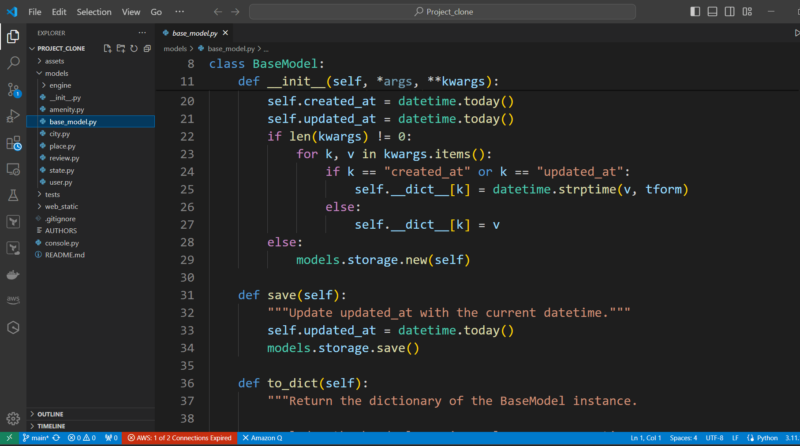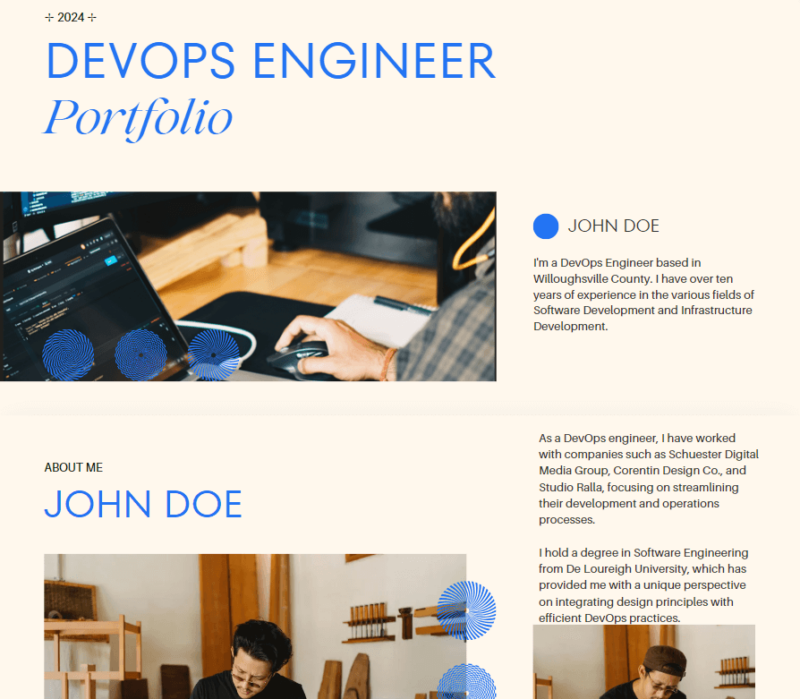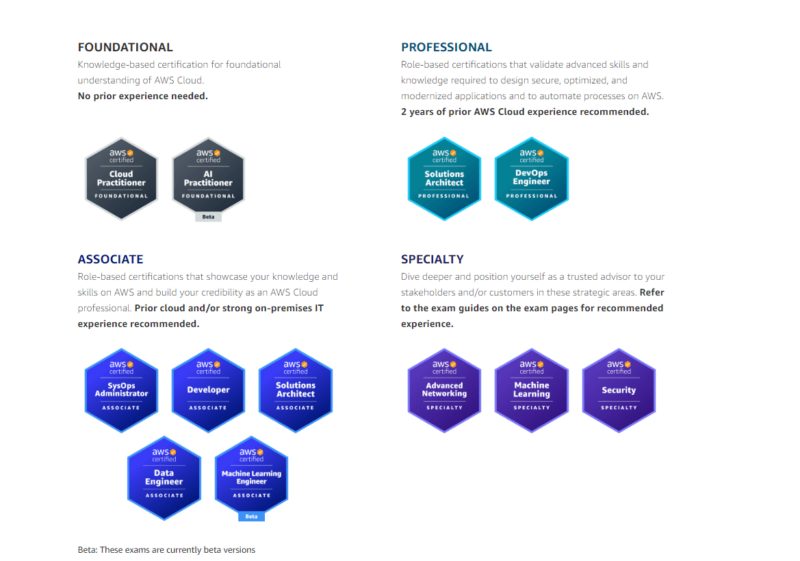How to Become a DevOps Engineer in 2024 (Without Experience)
People across industries are increasingly drawn to DevOps positions as they can improve operational efficiencies and accelerate innovation. DevOps combines software development and IT operations to improve the speed, quality and reliability of software delivery. If you’re wondering how to become a DevOps engineer, this guide explains what you need to do to land DevOps engineer jobs.
DevOps emphasizes collaboration, automation and continuous improvement among developers and operations teams. This approach has gained traction across many industries as it can enhance efficiency, reduce costs and increase customer satisfaction.
Industry trends highlight a growing adoption of containerization technologies like Docker and Kubernetes, the use of microservices architecture, and the integration of artificial intelligence (AI) and machine learning (ML) to enhance automation and predictive analytics.
As businesses continue to prioritize digital transformation and cloud computing, the demand for skilled DevOps engineers who can facilitate seamless and scalable operations is expected to rise, making it a compelling and rewarding career choice.
What Is a DevOps Engineer?
A DevOps engineer is an IT professional who bridges the gap between software teams and IT operations. They oversee code releases and deployments, ensuring the smooth operation of a company’s IT infrastructure.
A DevOps engineer works to streamline the software development lifecycle by automating processes, improving collaboration, and ensuring the reliability and scalability of software systems.
What Does a DevOps Engineer Do?
DevOps engineers use various tools and technologies to automate and streamline software development and deployment processes. These include tools such as Git and GitHub for version control, Jenkins for continuous integration, Docker for containerization, Kubernetes for orchestration, Ansible for configuration management and Terraform for Infrastructure as Code.
Roadmap: How to Become a DevOps Engineer (Without Experience)
DevOps engineering is a rapidly growing field that combines software engineering and IT operations to improve the speed, quality and reliability of software delivery. Becoming a DevOps engineer can be a rewarding career choice. However, breaking into this field can be challenging, especially for those with no prior experience.
Here are the 10 steps to DevOps mastery for complete beginners.
The following steps give a comprehensive guide for individuals to transition into a DevOps role, even without prior experience.
DevOps Engineer Roles and Responsibilities
DevOps engineers automate processes, optimize infrastructure and enhance the overall efficiency of software development. Their main roles and responsibilities include:
- Continuous integration and continuous delivery (CI/CD): This involves implementing and managing CI/CD pipelines to automate the building, testing and deployment of code changes, which reduces manual errors and accelerates release cycles.
- Infrastructure automation: Utilizing Infrastructure-as-Code (IaC) tools such as Terraform to provision and manage infrastructure resources ensures consistency, scalability and repeatability.
- Implementation of monitoring, logging and alerting systems: DevOps engineers must set up comprehensive monitoring, logging and alerting systems to track application performance, identify bottlenecks and potential issues, and send alerts when problems arise.
- Configuration management: You must be able to use tools such as Ansible, Chef or Puppet to set up, manage and maintain system configurations.
- Cloud infrastructure management: These engineers use cloud computing platforms such as AWS, Azure or Google Cloud Platform to build and deploy scalable, cost-effective and resilient applications.
- Security and compliance: DevOps engineers must integrate security practices into the development lifecycle by implementing security controls and ensuring compliance with industry standards and regulations.
- Performance optimization: You will continuously evaluate and optimize application performance to enhance user experiences, reduce costs and improve efficiency.
- Release management: This role involves coordinating and managing software releases to ensure a seamless transition from development to production environments.
- Collaboration and communication: DevOps engineers will foster collaboration between the development and operations teams as well as other stakeholders to align goals, streamline workflows and improve the overall efficiency of DevOps teams.
DevOps Engineer Salary
DevOps engineer salaries can vary due to factors such as experience level, location, company size and specific skill set. We will examine the current salary trends in the U.S.
How Long Does It Take to Become a DevOps Engineer?
Becoming a DevOps engineer from a beginner level takes anywhere from six months to several years. The process requires a significant commitment to learning and practice. While some people may claim that it’s possible to transition into this role within six months, this is a highly ambitious target.
The steps to becoming a DevOps engineer in six months would require full-time dedication and a well-structured learning plan covering many topics. A more realistic goal is 12-24 months. This would allow for a more thorough and less rushed learning process. Students should focus on building a strong foundation in development and operations while learning how to use DevOps tools.
Ultimately, the journey to preparing for DevOps engineer positions varies based on individual dedication, available resources and the chosen learning path. However, aiming for a longer time frame will ensure a more comprehensive and sustainable skill acquisition.
How to Become a DevOps Engineer From a Developer’s Perspective
Nasiullha Chaudhari is a DevOps engineer and YouTuber. He runs the Cloud Champ YouTube channel, where he covers his journey into DevOps engineering. He has a Bachelor’s Degree in Cloud Technology and Information Security, and he claims that he took the following steps to become a DevOps engineer:
- Learn Linux: He uninstalled his Windows operating system and installed Ubuntu on his laptop. Linux helped him become conversant with the terminal, as most tools in the DevOps space — such as Terraform, Ansible and Kubernetes — work with commands on the terminal.
- Learn about the software development lifecycle: He grew to understand the software development process, application creation and the components required in applications. This included the basics of networking, databases, different ports and protocols used in software development.
- Understand Git: Software developers use Git for their version control systems. They store their application code on Git platforms such as GitHub. He learned how Git works — for example, he discovered how to push code, commit, switch branches and use the different Git commands.
- Deploy on cloud platforms: He learned how to set up servers and workloads using cloud technologies such as AWS and Microsoft Azure. To boost his credibility, he also got certified as an AWS Cloud Practitioner and AWS Solutions Architect.
- Build projects: He completed projects and then posted them on his resume and LinkedIn profile to showcase his skills. Example projects include building a cloud resume, hosting a static site on Amazon S3 or hosting a WordPress website with an Amazon RDS database.
- Build his portfolio: To display his skills, he built his resume and LinkedIn profile. Recruiters view your portfolio to assess whether you are fit for a role. A portfolio gives the recruiter confidence to invite you for an interview. He got his first internship through LinkedIn.
- Gain experience: He engaged with clients as a freelance DevOps engineer, which helped him gain production experience. He also helped clients set up their infrastructure, such as applications and websites, on the AWS cloud. In addition, he advised that one should strive to gain experience — including by working for free — to prepare for DevOps jobs.
How to Get Into DevOps From Scratch: According to Reddit and Quora
There are plenty of discussions happening on online platforms about how to become a DevOps engineer.
On Quora, Thulasiraman VB — a DevOps consultant at IBM — stated the following:
“From the technology perspective, Devops is [a] collection of tool set[s], we should … know to automate the Deployment. As it’s a collection of tools, don’t think you should know everything. Start with Linux (Heart of DevOps) and Cloud (AWS, GCP & Azure – Anyone). Then gradually, you can learn other tools used in Devops. As I work in the same stream, I never recommend to join any course without knowing the fundamentals of Linux & Cloud. We do have lot[s] of technical videos from YouTube freely. Start with it. Grow gradually.”
Matt Spaulding, another Quora user with DevOps experience, had this to say:
“You should have a good balance between development skills and operational knowledge. Some of the absolute basic skills you are going to need is experience with a scripting language like Python, shell scripting with Bash, and command line experience with Linux. If you know your way around a Linux system and you have enough experience to write scripts to automate server tasks, you’re well on your way to becoming a DevOps Engineer.”
On Reddit, user shadowisadog — a developer and recruiter — made this comment:
“DevOps is not an entry level role. When I hire a DevOps engineer, it is a senior level engineer who comes from a relevant background, say Software Development or System Administration. There are a lot of tools and techniques that are needed for the job, but the most important is the ability to understand why.”
Another frequent Reddit user, Kwyjibo1, said the following:
“You will want to learn as much as you can about git. Learn Python or Go. Get experience with scripting. Look [at] what it takes to be a developer. You won’t necessarily be doing that, but it’s a good starting point. You will need some experience with cloud tech, so look at Azure or AWS. Jenkins and Gitlab experience is helpful. You can download them and install them in a homelab environment and start to play around with them. Docker and kubernetes. I think AWS offers a devops cert you might try.”
Final Thoughts
Becoming a DevOps engineer requires a combination of technical skills, soft skills and practical experience. By following the steps outlined in this article, you can gain the necessary knowledge and skills to succeed. Focus on building a strong foundation in programming, automation and cloud computing, as well as developing soft skills such as communication and problem-solving.
Keep in mind that it is a continuous learning process. The field is constantly evolving, and staying adaptable and open to new ideas and technologies is essential. Remember to build a portfolio of projects and network with DevOps professionals in the field, as it will increase your chances of success. It also takes time. Be patient and committed to the goal.
Thank you for reading our article. We would love to hear from you. What did you find interesting? What more would you like to learn about DevOps engineering? Please share with us in the comments section. We invite you to engage with more articles on our page to broaden your knowledge. Happy learning.
FAQ: DevOps Engineers
-
DevOps engineering requires a blend of technical skills, soft skills and experience. Technical skills include programming, scripting, and knowledge of operating systems and cloud systems. You must also be familiar with Infrastructure as Code, CI/CD pipelines, dashboard monitoring, source code management and security. The soft skills required include collaboration, communication, problem-solving and adaptability.
-
The time to become a DevOps engineer can vary depending on the skill set, experience and depth of knowledge you wish to acquire. However, one can learn the basics required to apply for entry-level DevOps roles in 6-12 months.
-
To start becoming a DevOps engineer, learn the DevOps fundamentals and principles. Use the DevOps roadmap to plan your learning, and research what tools to use to develop your DevOps skills. Build portfolio projects to showcase your skills and acquire the soft skills required to join a DevOps team.
-
DevOps engineering requires some coding knowledge. It’s not necessary to be a skilled programmer, but having basic programming skills and completing coding projects will be essential to a DevOps engineer. These skills are useful in automating tasks, troubleshooting issues and understanding the codebase.
Sources


